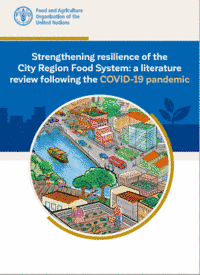Global study on lessons learned from multiple shocks and stresses on CRFS
Multiple shocks and stresses, such as climate change, pandemics and conflicts, have disrupted global agrifood systems, affecting food security, nutrition, and livelihoods. The COVID-19 pandemic, in particular, emphasized the urgent need for local governments to strengthen food system resilience to withstand health, climate, and economic challenges.
In this context, FAO conducted a global study to assess how local food system actors have perceived recent shocks and stresses on their food systems; to identify collective actions and public policies in response, including the role of local governments and food system actors; and to offer insights into enhancing food system resilience in city regions across the world.
The study was conducted in collaboration with CIRAD and RUAF, and is based on three key components: 1) a literature review on lessons learned from COVID-19 in local food systems, 2) a global survey on urban food systems and city responses, and 3) an in-depth analysis of the impacts and responses of food system actors to various shocks and stresses.
The synthesis report presents an overview of the key results, conclusions and the way forward for building resilience against multiple shocks and stresses.
The study components: Literature review, global survey, comparative analysis, and case studies
To enhance the resilience of food systems, it is essential to understand the long-term impacts of recent global shocks and stresses and extract key lessons learned. Starting with a literature review, the study explored underpinning concepts such as the resilience of CRFS and its unique aspects, the impacts of the COVID-19 pandemic on food systems, and responses to build resilience. It offers a targeted perspective on how the pandemic has influenced current thinking around food system resilience.
In collaboration with city networks, FAO then launched a global survey, targeting all actors of the food system, from producers to consumers as well as government officials, researchers, and experts. It aimed to identify the most important impacts of shocks and stresses on CRFS; document responses, and explore important enabling characteristics of city region food systems. The survey received 182 responses from 147 different cities in 69 countries. The majority of respondents were experts and researchers, CSO representatives, and city officials or elected representatives.
Finally, the study took a closer look at eleven cities across various regions, capturing perceptions from different CRFS actors of recent shocks and stresses and their impacts, new or existing collective responses and policies, their outcomes, and future directions. The comparative analysis provides insights into how the eleven cities can strengthen resilience at the city region food system level, and offers future directions for other city regions across the world.
|
This work is supported by the Federal Ministry of Food and Agriculture (BMEL) of Germany, in collaboration with CIRAD, RUAF, and several city networks, including C40 Cities, ICLEI, the Milan Urban Food Policy Pact (MUFPP), the Resilient Cities Network, and United Cities and Local Governments (UCLG).
|
|
|
|---|
|
|
|
|
|
|---|
The work is a collaborative effort, conducted by Thierry Giordano (CIRAD), with contributions from Jess Halliday (RUAF) and the FAO CRFS team, including Guido Santini, Carmen ZuletaFerrari, Roman Malec, Isabella Trapani, and Jia Ni.

















